by Jonathan Ralph Mutchler
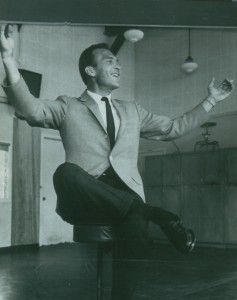
(Note: This was written in the Spring of 1997 as part of a script used in a tribute concert for Olympic College. It seemed like an appropriate thing to add to this web page. If there are more details of Dad’s life that you have have or you think the Mutchler family would be interested in, please send them to me. Thank you! JRM, February 2005)
YOUTH
It seemed likely that Ralph Daniel Mutchler would follow his grandfather, father, and older brother in a life of farming.
Born November 20, 1929-the youngest child of Ross and Pearl Mutchler- Ralph spent his entire youth in the small farming town of Northwood, ND.
This town of less than 1000-located about an hour from Grand Forks, 2 Hours from (the now famous!) Fargo-provided the environment which shaped the young Mutchler.
In Northwood he learned the value and discipline of hard work on the farm. For as he grew, his farming responsibilities increased as he contributed to the success of the family farm by hauling wheat and cultivating potatoes.
Like many American boys at the time, he loved hunting, fishing, and the outdoors and could often be found camping and rafting at one of the streams that flowed through one of the Mutchler quarters.
And as a young lad, he began taking piano and saxophone instruction at some 50¢ a lesson.
It’s hard to know when Ralph began to dream of becoming a professional musician. But as a young teen he would always try to catch the traveling dance bands who could be heard through the streets of Northwood when they would play at the local dance halls. Too young to get in, Ralph would climb the rear fire escape ladder where through a break in the curtains he would watch, listen, and dream. Ralph also began establishing friendships with these musicians.
Older brother Jim was also a musician-a fine trumpeter-who had his own dance band. Mutchler began playing sax with the band at age 15. He eventually took over the band when Jim was drafted in WW2 in ’43.
The war turned out to be a blessing to the young Mutchler. Bands were scarce stateside so “The Ralph Mutchler Orchestra” always had plenty of work. Their favorite place to play was the State’s Ballroom in East Grand Forks, Minnesota.
Showing his sense of humor, when Ralph knew that that a popular band like Woody Herman’s would be playing on the same stage the following Saturday night, he’d love to boast by announcing that “Next Saturday night, ANOTHER great band will be here on stage-Woody Herman!”
They played in East Grand Forks frequently-until the State’s Ball Room burned to the ground.
So, as a teenager, Ralph learned to write, direct, perform, and manage a swing band-gaining more experience and musical wisdom than older musicians in bigger cities like Chicago.
This background led Bremerton Sun writer Boyd Hagen in 1967 to call Mutchler the “swingingest farm boy ever to shake the dusty wheat fields of North Dakota in favor of a musical career.”
COLLEGE/FARGO
But a music career didn’t come right away: After high school-and following the path paved by his upbringing-Ralph attended and graduated with a Bachelor of Science degree from the School of Agriculture at North Dakota State College in Fargo.
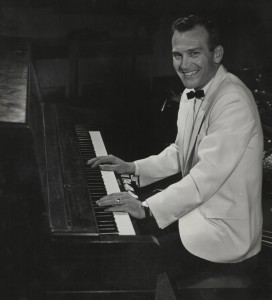 Of course he had his own band in Fargo and when he had time he took some music classes at the college. One of those was a music theory class taught by a young Robert Dietz who noticed Mutchler’s early talent in 1950. After Fargo he wouldn’t see Ralph again for 10 years.
Of course he had his own band in Fargo and when he had time he took some music classes at the college. One of those was a music theory class taught by a young Robert Dietz who noticed Mutchler’s early talent in 1950. After Fargo he wouldn’t see Ralph again for 10 years.
DRAFTED/ARMY
After North Dakota State Uncle Sam required Mutchler’s service.
He did his basic training in Missouri. He spoke to his brother Jim-recently returned from a tour in Italy-about army life. Mutchler wasn’t thrilled with the idea of going to Korea so Jim gave his younger brother some advice and a plan. He said, “Ralph, go down to your service club and play the piano there every night and see what happens.” It worked. The good players started jamming with him and in no time Ralph was in charge of the entertainment at the club. This quickly led to a transfer to the Sixth Armored Division Band at Ft. Leonard Wood where he became the assistant director of the division band and directed the dance band.
This also opened the door to six months of schooling at the U.S. Naval School of Music in Washington, D.C. where his arrangement of I’ve Got You Under My Skin was recorded on a major label with the legendary Willis Conover band. His arrangement ofAla Mode was also recorded on Columbia Records.
AFTER ARMY: CHICAGO (part 1)
After the army Ralph continue to pursue his musical dream and moved to Chicago. Although he was a regular face in Chicago’s famous Rush Street area and gigging all the time, he nearly starved. In his words, he returned to farming after the army, “a bit withered and wilted.”
BACK TO FARMING
But music was still there and in no time he was gigging again in Eastern North Dakota. Brother Jim recalled his determination and discipline: “Ralph would work all day on our farm until 5 pm when he’d leave for a gig in some remote corner of North Dakota. He’d return around 4 in the morning then get up at 6 AM to farm again.”
This wasn’t going to last long! For he didn’t care for farming. In his words, “there were too many chiefs and too few Indians.” Too many bosses, not enough workers-and he was one of the workers and loathed it.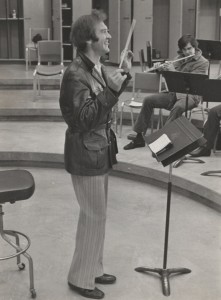
In 1956 Ralph married Marilyn, a young widow with a daughter, Lyndee. They would eventually add three boys to the family Jonathan, Gregory, and Christopher. Currently, Lyndee and her husband Allen reside in Port Angeles, WA. Jon and wife Diane (Lofall) in Ferndale, WA. And Greg and Chris with wife Chris (Olson) are in Bremerton.
But early in the marriage, Stan Kenton invited Ralph to go on the road with him and arrange. Perhaps because of his new family, he decided to stay on the family farm where for a short time he continued to work with his father and brother, even managing the smaller Mutchler operation in Del Ray Beach, Florida growing potatoes.
NORTHWESTERN/CHICAGO (part 2)
But restless, he and Marilyn (with her encouragement and support) decided that if music was in his heart he should give it his best try. So the Mutchlers moved to Chicago where where Marilyn taught school and Ralph gigged and attended Northwestern University in Evanston. He studied and worked with the legendary Dr. John Paynter, Director of Bands and Professor of Music Theory.
One of the school requirements was that music students needed to march in the band. After the army Mutchler was tired of marching but learned that if he wrote of the Northwestern Marching band he’d be exempt from marching in. Necessity at this point then led to extensive experience and exposure to arranging for the marching band.
He gigged a lot and one of his groups had as its lead singer a young Ann Margaret. Ralph finished his Bachelors in 1959 while Marilyn completed her Masters. In ’60 Mutchler obtained his Master’s in Education.
OLYMPIC COLLEGE
After graduation Ralph applied for work with various bands and at different colleges. In 1960, Bob Dietz, now in Bremerton, noticed Ralph’s name on a list of candidates for the band position at Olympic College. Ralph had several job offers but Bremerton-and the West Coast (far away from farming!) appealed to him. Ron Gillespie, at that time superintendent of all Bremerton music, hired Ralph to replace Wendal Jones in the Fall of 1960 as Olympic College Band Director.
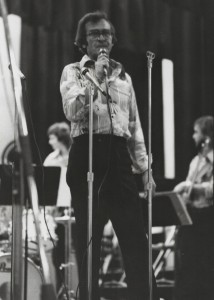 At Olympic Ralph polished up his writing and arranging skills putting out numerous works for marching band, stage band, concert bands-and everything in between. And he always wrote in such a way so as to tailor it to the particular band and get the most out of it. Ralph commented: “Our philosophy then was to make the chart fit the band.”
At Olympic Ralph polished up his writing and arranging skills putting out numerous works for marching band, stage band, concert bands-and everything in between. And he always wrote in such a way so as to tailor it to the particular band and get the most out of it. Ralph commented: “Our philosophy then was to make the chart fit the band.”
He eventually produced over 500 arrangements and had some 45 of his works published.
Ralph was also involved a lot in local Bremerton music, including the local symphony where he played clarinet, and gigging in the area with side men like Cap Dimiero, Steve Funk, and D.J. Watson at Bremerton hangouts like the Beachcomber, Quarterdeck, and Hearthstone.
In the early 60s Ralph and Marilyn ended their marriage. Neither remarried and remained friends. Ralph always lived near the children and provided some fine musical opportunities for them. Marilyn Mutchler taught in the Bremerton schools and had a very distinguished career in education until her retirement in the 90s and still lives in the family home on Kitsap Lake she and Ralph purchased about 1961. She did a remarkable job of raising the 4 children, all who have done well with their lives.
In 1967 Ralph published a text book on writing and arranging for the marching and pep bands which became a help and guide to many young writers: A Guide to the Arranging and Scoring for the Marching or Pep Band.
One early arranger at Olympic College was student Jim Brush who worked in Bremerton schools for years. Besides being one of Ralph’s first students, he was also one of his early copyists. Jim recalls Mutchler’s ability to inspire others to further their own music education. Both Brush and a young bassist named Rufus Reid continued their musical training at Northwestern following their time with Ralph.
And as a director, few could expect and get so much out of musicians. Many musicians will recall struggling during those early September rehearsals through his easy arrangement of Mercy, Mercy, Mercy, and then 5 months later racing at high speeds through his creative swing arrangement of Easy to Love. He could transform musicians who didn’t know which end to blow into monster bands.
Ralph was actively involved with and committed to jazz education, being a long time member of the National Association of Jazz Educators. And consistent with his passion to see education of jazz promoted, he completed his Doctorate of Education in 1968 at Colorado State College in Greeley.
At about this time the college built a new music building which it still uses today.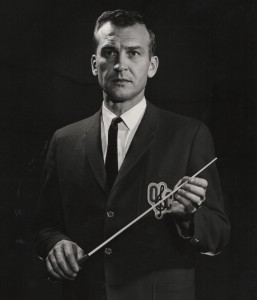
JAZZ FESTIVALS
But it was the jazz festivals – 15 of them from 1960 – 1974 – that gave Dr. Mutchler and Olympic College national prestige.
The first festival, begun by Ralph’s predecessor in 1960 may have had 4-5 bands participating. By the time the festival outgrew its facilities in ’74 some 80 bands were playing and others turned away.
For many people this 3 day event marked perhaps the most exciting weekend each year in the city of Bremerton. Many of us seem to remember that it never rained during this May weekend. It couldn’t!!
Although the O.C. festival inspired other jazz events for high school and college bands, The O.C. festival was considered the grand daddy and most prestigious to win. It was the Superbowl of jazz competition.
Numerous outstanding musicians adjudicated and presented clinics at these festivals. It’s a “who’s who” list of friends and colleagues of Mutchlers: Buddy DeFranco, Johnny Smith, Doc Severson, Quincy Jones, Gary Burton, Lou Marini, Dick Grove, Buddy Baker, and Stan Kenton. Stan, of course, used Ralph for years at the ever popular Kenton clinics which were held annually on the campuses of several major universities. As a regular clinician for Stan, Mutchler broadened his influence among jazz students and educators.
But the festivals did come to an end: as Ralph said, having grown into “a monster of our own creation.” Many of us today regret that they didn’t continue-somehow.
The festivals and Ralph Mutchler made O.C. a household name for anyone in tune with jazz education. Early on, O.C. was one of the first and only places that produced qualified jazz musicians.
Many musicians went on to full time careers performing or teaching after their time at Olympic. Many more are not professional musicians today. But they still pick up their horns and play in park concerts, local jam sessions, or “gig” part time in groups that still play RDM tunes today.
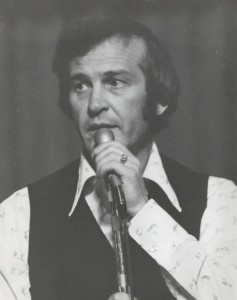 Often times taking their cue from Ralph’s lighter side, O.C. bands also knew how to entertain with a certain, “style.”. Few have forgotten band man Dannys Ward’s famous sax solo at the Seattle Center when he was in Ralph’s band. At the right moment Danny stepped a few feet from where the band was performing outside into a pool of knee deep water where he played his entire solo.
Often times taking their cue from Ralph’s lighter side, O.C. bands also knew how to entertain with a certain, “style.”. Few have forgotten band man Dannys Ward’s famous sax solo at the Seattle Center when he was in Ralph’s band. At the right moment Danny stepped a few feet from where the band was performing outside into a pool of knee deep water where he played his entire solo.
Ralph’s sense of humor was often found in the titles of original tunes. Two songs were written as features for festivals, There’s A Fly In My Soup and Send In the Clones. Earlier on there were songs like Wiggy, Diggin, Cookin, I’ll Marimba You and the famous Mopsy trilogy.
Mopsy was the Mutchler’s Lahasa Apso dog and became the name of one of Ralph’s jazz charts. When the Mutchlers successfully bred Mopsy the second song came along, More Mopsies. Then Mopsy was sold with most of the litter. So finally, the final piece in the trilogy: No More Mopsies.
Another example humor came from a request from University of Washington Husky Band director, Bill Bissell. Ralph wrote dozens of arrangements for the nationally recognized Husky band, including the unofficial Husky theme song arrangement ofTequila. Bill wanted an arrangement of the Universities fight song, Bow Down To Washington in a somewhat classical style.
Mutchler, finding inspiration in the overtures of Rossini, reworked the themes of the noble fight song into a clever parody that’s still played today. He named it, Bow Wow Overture. There was also the clever antiphonal Dueling Tubas (a rip-off of Dueling Banjos).
Through the years outstanding musicians became part of its faculty: Don Mock, Floyd Standifer, Dan Dean, Tom Collier, Joe Field, and others.
Ralph’s tenure at Olympic came to an end in 1982. Many of us regret his early retirement, but he felt it was the right thing for him to do.
AFTER OLYMPIC COLLEGE
But he couldn’t sit still. With a number of former students like Mark Donelson, Matt Stewart, Steve Rasmussen, Larry Anderson, Trent Leurquin, and Bob Barnes, The Big Apple Band was formed.
In a sense, this was a returning to his roots by Ralph, where he begin to write again-some 100 charts-for a smaller nine or ten piece group. Much as he did in North Dakota.
The band had its season, playing at the Bayview and Olympic Inn off and on during the 80’s. And of course, each band year was climaxed by the annual “Last Blast” jam session and picnic at Mutchler’s home in Holly near Seabeck. (The band occasionally continues to play today under a new incarnation called The Rainy Day Jazz Band, and under the direction of one of Ralph’s sons it still plays the RDM charts.)
Mutchler also tried to take advantage of retirement time by returning to the outdoors-usually which some of his Bremerton cronies who affectionately called themselves The Buffoons.
Ralph Mutchler had an outstanding career. He helped and inspired many young musicians. Sadly-and like so many musicians-his life needlessly ended too soon. Dad succumbed to years of fighting a personal battle with drinking and depression and died in 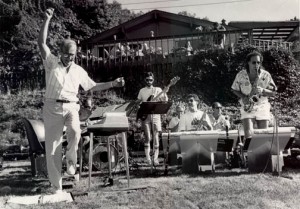 his Holly Beach home of a self inflicted gunshot wound on November 17, 1989, 3 days short of his 60th birthday.
his Holly Beach home of a self inflicted gunshot wound on November 17, 1989, 3 days short of his 60th birthday.
We would have all enjoyed the musical and personal contributions he could have made in what would have been his golden years.
Text written and compiled by Jon Mutchler, March 1997, (P.O. Box 1834, Ferndale, WA 98248/ (360) 384-9092. Thanks to The Bremerton Sun, Marilyn Mutchler, Lyndee (Mutchler) Lapin, Ruth (Mutchler) Thompson, Jim Mutchler, Jim Brush, Cap Dimiero), Olympic College Music Dept. If you wish to contact Jon Mutchler click here. Text updated November 2009


